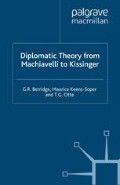Abstract
Francesco Guicciardini was born into a long-established patrician family in Florence in 1483. He trained and then practised successfully as a lawyer, but in January 1512 was sent by the signoria, despite his youth, as ambassador to Spain.1 His mission was conducted against a background of acute tension and at a time when the goodwill of Ferdinand the Catholic — that master of deceit’ 2 — was of the first importance to the republic. (Ferdinand’s soldiers, only recently allied to those of Pope Julius II against Florence’s ally, France, were entering the nearby Romagna.) Guicciardini remained in Spain until 1514. In his absence, and despite his diplomacy, the Florentine republic was overthrown by Spanish arms, the Medici restored, and his native city subjected to the influence of Rome. This meant at least that positions in the Papal administration were open to the city’s citizens, and in 1516 Leo X appointed Guicciardini governor of Modena and in the following year added Reggio to his responsibilities. This was the start of a twenty-year-long career during which he served three popes and rose ever higher in their esteem, though this did not always endear him to his fellow Florentines. He died in 1540, having served, inter glia, as lieutenant-general of the papal army and governor of Bologna, the most important of all the Papal lord-lieutenancies.3
Access this chapter
Tax calculation will be finalised at checkout
Purchases are for personal use only
Preview
Unable to display preview. Download preview PDF.
Further reading
Works by Guicciardini in English translation (excepting Spongano)
Francesco Guicciardini, Maxims and Reflections of a Renaissance Statesman (Ricordi) translated by Mario Domandi, introduced by Nicolai Rubinstein (New York, Evanston and London, 1965). Contains Series B and Notebook 2, as well as the final version of the Ricordi Series C, together with a very useful ‘Table of Correspondence’.
Raffaele Spongano, Francesco Guicciardini: Ricordi Edizione Critica (Firenze,1951).
Francesco Guicciardini, Selected Writings, edited and introduced by C. Grayson, trans. M. Grayson (London, 1965). This contains the Ricordi (Series C only), ‘Considerations on the “Discourses” of Machiavelli on the First Decade of T. Livv’, and the Ricordanze.
Guicciardini’s Ricordi: Counsels and Reflections of Francesco Guicciardini trans. by Ninian Hill Thomson [first publ. 18901, edited by G. R. Berridge (Leicester, 2000; available through www.allandale.co.uk).
Francesco Guicciardini, The History of [M1,1’115611 translated, edited, with notes and introduction by Sydney Alexander (New York and London, 1969; Princeton, NJ, 1984) - esp. Book One, pp. 3–9, on the balance of power. These famous pages are also reproduced in Moorhead Wright’s excellent collection: Theory and Practice of the Balance of Power, 1486–1914: Selected European writings (London, 1975), pp. 7–12.
Guicciardini: History of Italy and History of Florence trsl. by C. Grayson, edited and abridged with an Introduction by John Hale (London, 1966). This heavily abridged work only covers the parts of Guicciardini’s two histories dealing with the years from 1492 to 1498, though the parts which are reproduced are themselves uncut. Hale’s introduction is very useful, though it is poorly sourced.
Historical background
As for Machiavelli; see previous chapter.
Biography
Ridolfi, R., The Life of Francesco Guicciardini trsl. C. Grayson (London, 1967; New York, 1968), chs 4, 5, pp. 146–7; chs 18 and 19.
Whitfield, J. H., Discourses on Machiavelli (Cambridge, 1969), ch. 5 (’The case of Guicciardini’). This is a long, favourable review of Ridolfi’s biography, in which Whitfield makes comparisons between Guicciardini and Machiavelli.
General
Butterfield, H. and M. Wight (eds), Diplomatic Investigations: Essays in the Theory of International Politics (London, 1966), ch. 6 (Butterfield, `The balance of power’). Chahod, Federico, Machiavelli and the Renaissance trans. from the Italian by D.
Moore (London, 1958), index refs. to ‘Guicciardini’.
Gilbert, F., Machiavelli and Guicciardini (Princeton, NJ, 1965), ch. 7.
Hale, J. R., `Introduction’ to Guicciardini: History of Italy and History of Florence (see above).
Luciani, V., Fr. Guicciardini and his European Reputation (New York, 1936).
Symonds, J. A., ‘Guicciardini’, Encyclopaedia Britannica (1885).
Wright, Moorhead (ed.), Theory and Practice of the Balance of Power, 1486–1914: Selected European Writings (London, 1975), pp. ix—xii.
Copyright information
© 2001 G. R. Berridge, Maurice Keens-Soper and T. G. Otte
About this chapter
Cite this chapter
Berridge, G.R. (2001). Guicciardini. In: Diplomatic Theory from Machiavelli to Kissinger. Studies in Diplomacy. Palgrave Macmillan, London. https://doi.org/10.1057/9780230508309_3
Download citation
DOI: https://doi.org/10.1057/9780230508309_3
Publisher Name: Palgrave Macmillan, London
Print ISBN: 978-0-333-75366-8
Online ISBN: 978-0-230-50830-9
eBook Packages: Palgrave Political & Intern. Studies CollectionPolitical Science and International Studies (R0)

